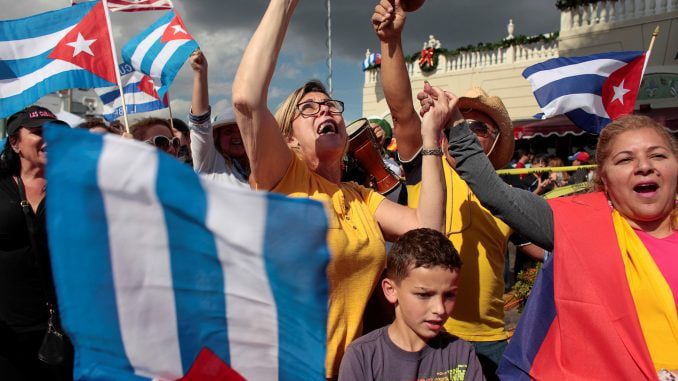
Fidel Castro’s death has me thinking about pineapples. We ate a lot of crushed pineapple in Cuba that year it may have been 1956. If so, I was seven and my brother was five or six, and we had never had the Pacific fruit before.
As we learned later from our father, long wooden crates of cans of crushed pineapple make good containers for smuggling rifles. A year or so later, on a day when our mother stayed on the phone all day and paid little attention to us, we found out that she was selling bonds to raise money for the fight against Fulgencio Batista, Cuba’s repressive dictator.
Fast forward to 4 a.m. on New Year’s Day 1959. Our grandparents knocked on our window to bring news that Batista had left the country. My brother and I experienced, through our parents and everyone else we knew, the joy of the triumph of the revolution and the coming era of democracy, basic human rights, and the free elections Fidel Castro promised to hold in 18 months. It was really interesting to see and hear through young eyes and ears what was happening.
But even an 11-year-old could do the math when July 1960 came and went without elections. Sadly, we were now at the same point under another dictator. (During the time of Batista one of my uncles had been imprisoned for giving refuge to an air force officer who planned to flee the country. Later, under Castro, another uncle was imprisoned simply for possessing an outboard motor.)
By sometime in 1960 our mother’s two older siblings had reached the conclusion that Castro was not interested in democracy or human rights, and that he was taking the country toward communism. The arguments were lively, and our grandparents had to calm things down every now and then.
During one of the discussions, our older aunt and uncle recounted that while in college in the 1920s, they heard from avowed communists the phrases and slogans that were now being bandied about. In 1960 a commonly heard question among friends was whether another friend who had welcomed the revolution enthusiastically had “abierto los ojos,” “opened the eyes,” meaning “realized what was happening.”
A few months after our older uncle and aunt, our mother abrió los ojos, and in time our father and our younger uncle did also. Then there was the speech by Castro in October 1960 admitting that the Cuban Revolution was a Marxist-Leninist revolution.
The next morning, our parents decided to send Andrew and me to the United States, so that we would grow up in a free country. It took a while for the paperwork on both sides of the Florida Straits to be completed, and Andrew and I arrived here, without our parents, on June 27, 1961. After living in Miami; New York; and Columbia, S.C.; eventually we made it to Fayetteville. We both attended N.C. State University, where he majored in pre-med and I in civil engineering. A year after earning my degree I married a North Carolina girl who has been my bride for 44 years.
I tell my friends that when I arrived in June 1961, that was the day I was born again.
Can Cuba be born again now that Castro is in the ground? With Fidel truly gone, will Raúl make any changes that would move Cuba toward being a free country? Too many have died at their bloody hands not to hope, but I doubt it. The regime’s primary objective is to hold absolute power at all costs; of course, that is inconsistent with democratic reforms. As to this, President Obama has not opened his eyes. Let’s hope that president-elect Trump has.
Jorge Cowley is an engineer and lawyer who has called Charlotte home since 1979. He holds engineering degrees from N.C. State University and the Massachusetts Institute of Technology and a law degree from UNC Chapel Hill. His parents eventually came to the United States as well.



